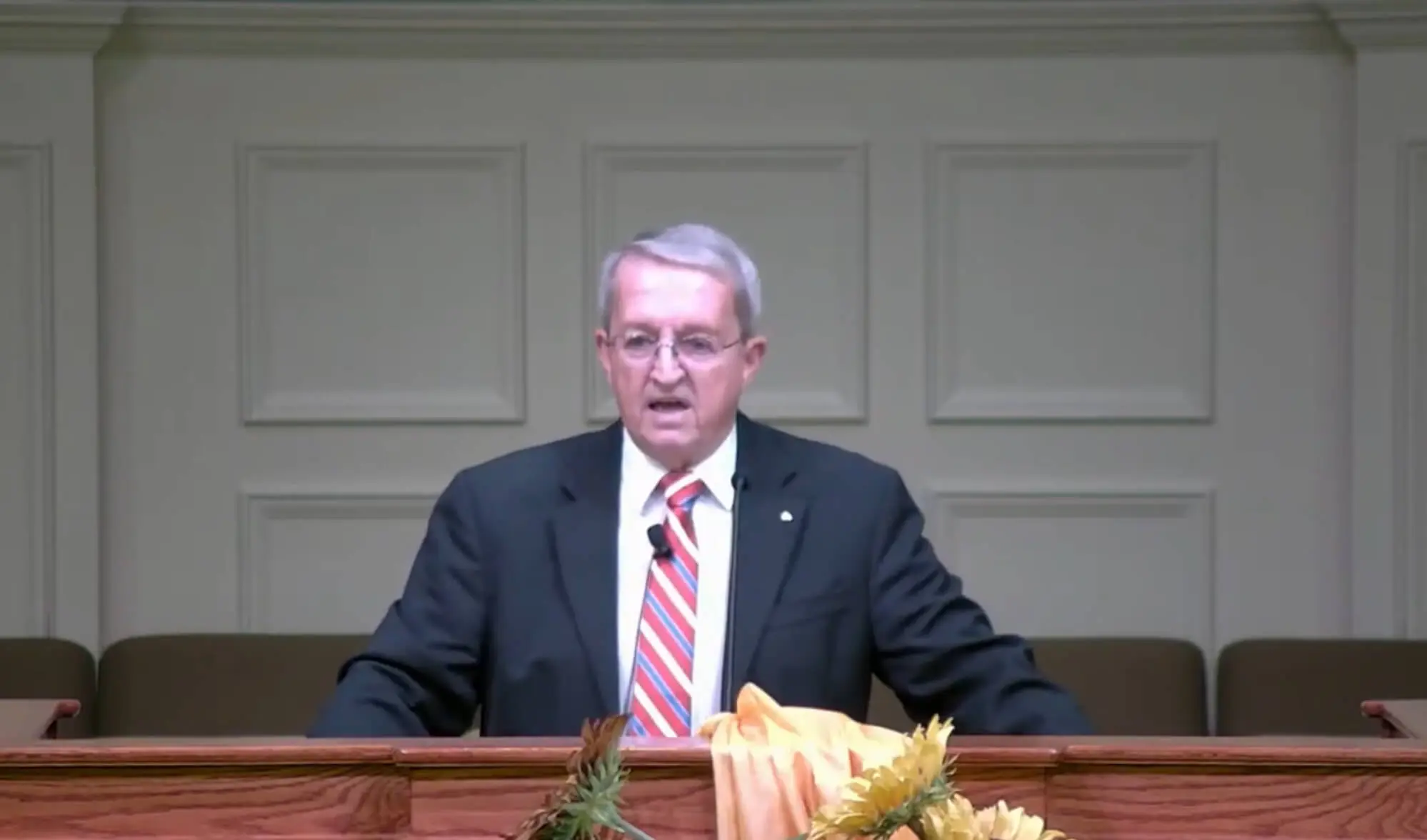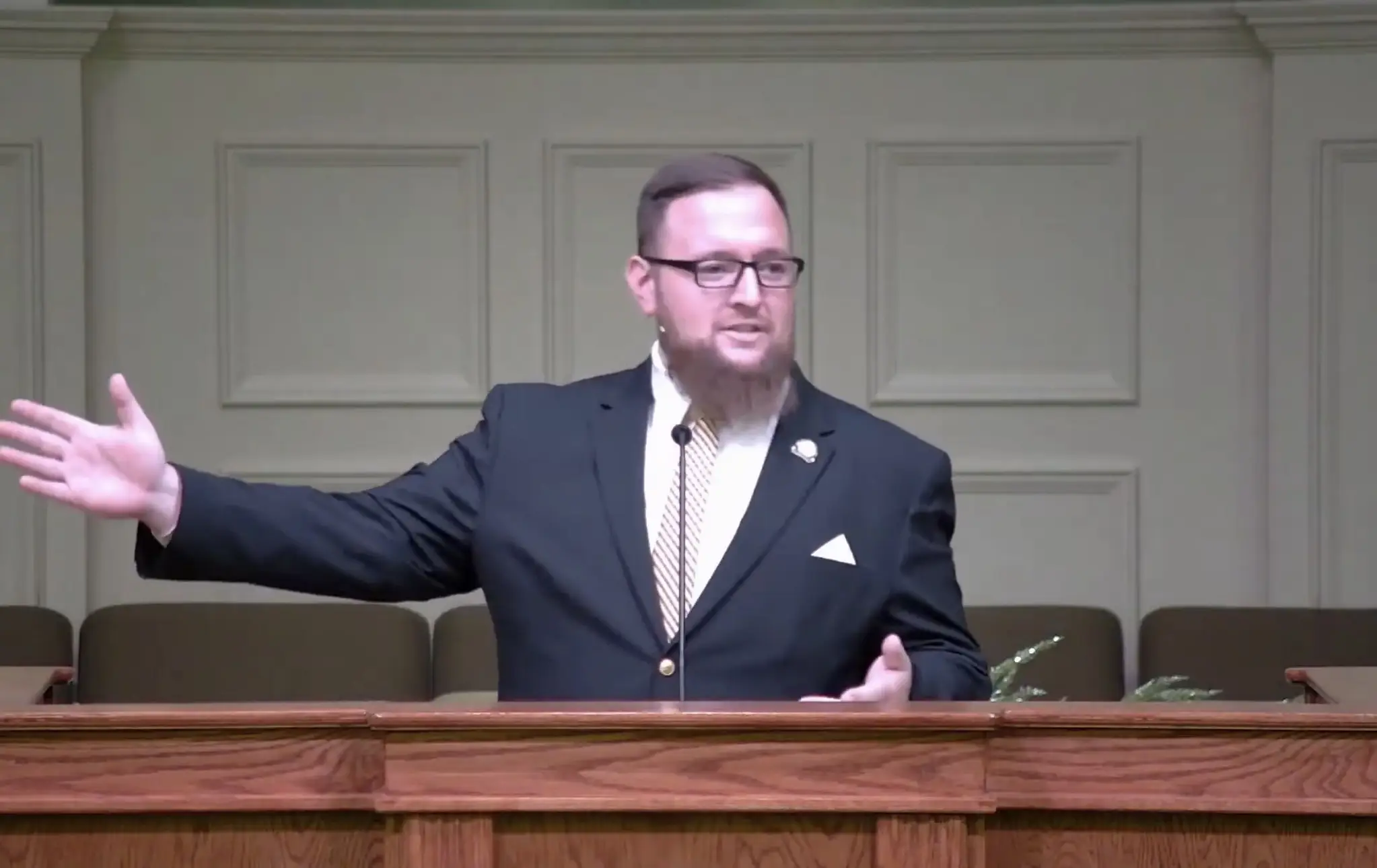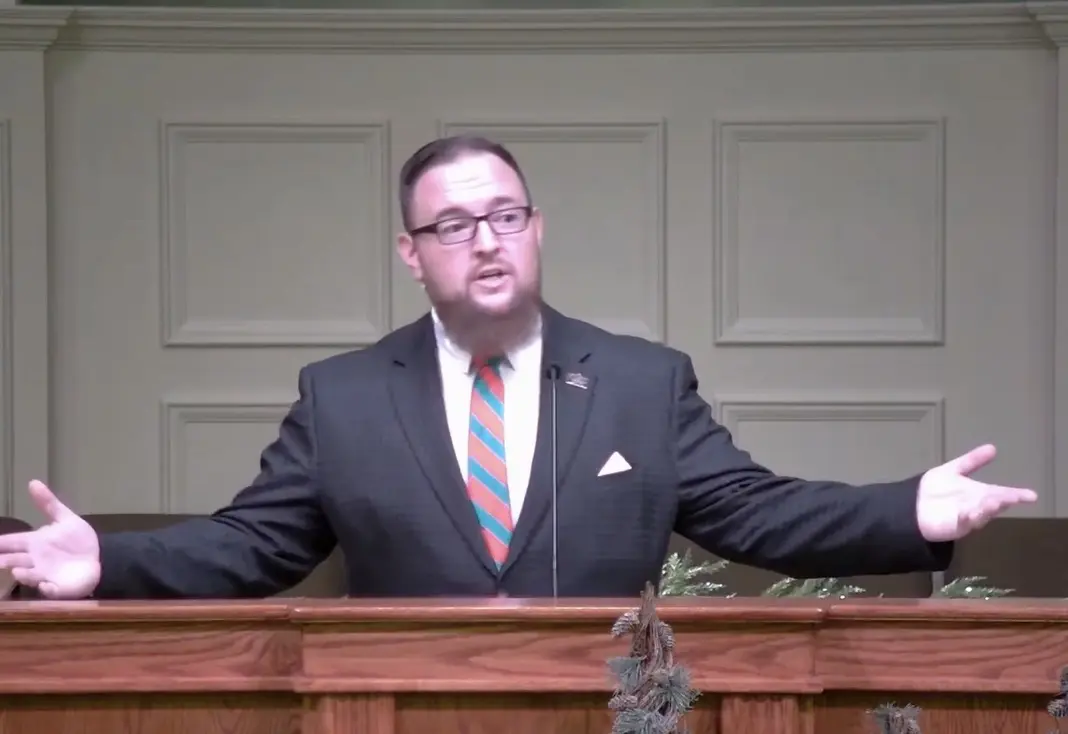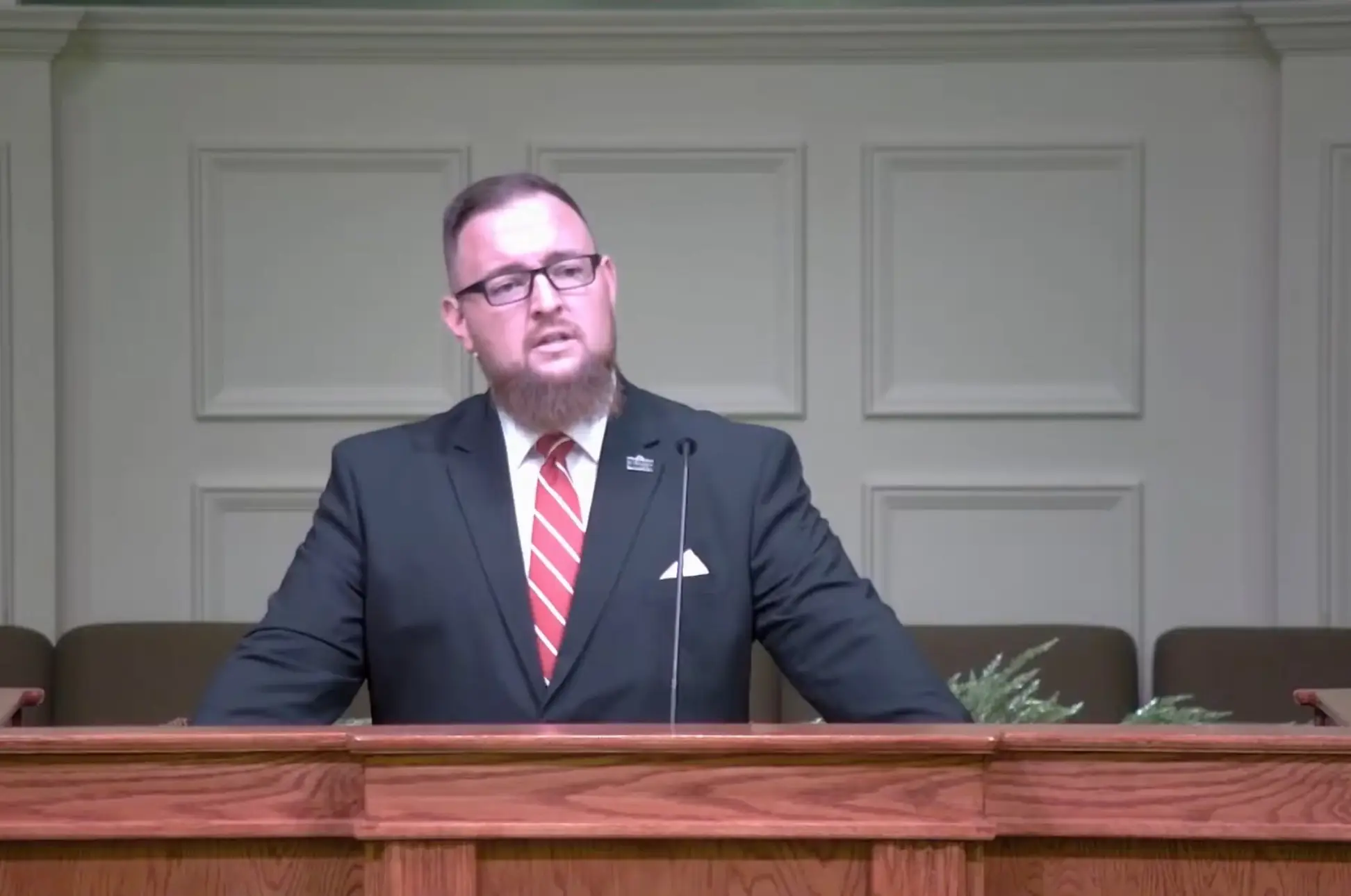Video
“Sound Doctrine”
1 Timothy 1:1-20
Pastor Richard C. Piatt II
07/14/24
Audio
Transcript
It’s a beautiful song, isn’t it? I love that. And especially that when it goes in that second phrase, you could tell that the author of that particular song has a personal relationship with Jesus Christ. And I would trust that each and every one in the auditorium this morning would have that as well. If not, please don’t leave this place without us talking to you about that particular need in your life to know Christ. Well, take your copy of God’s holy inerrant, inspired, sufficient word of God. And let’s go back to first Timothy chapter one.
Now, I mentioned chapter one because we’re going to look at in a broad way this whole chapter, because my purpose for going through first Timothy is basically to go through first and second Timothy. And I wanna get to those and we’re gonna, and I have preached through First Timothy several times in 30 years of pastoring here, but I don’t want us to lose sight of Paul and his characteristic writing and so forth. So we’re gonna take bigger chunks in this and we’re gonna look at Lord willing, the overall purpose of Paul writing to Timothy. And it becomes important because Just once again, even, just going to Jamaica and talking with this church and being there preaching a couple of Sunday nights ago, there at Faith Baptist Church, I’m reminded again of the importance of the local church. and what it’s like.
And talking with Pastor David at the Uprising Church in Jamaica, Montego Bay, another church, because he is pastoring two churches. And he makes mention of the fact how that, you know, the purpose of them, how different they are. And it just, once again, in talking with him, it reminds me of how churches are different. But what is that which is essential to the local church? What is it that we can, I hate to use the word compromise, but I suppose I can use that word in this context. What can we compromise or what do we allow for things concerning culture? And then what do we say, but what is essential? And I think that was on the heart of the Apostle Paul as he writes to a young preacher. There seems to have been in the establishment of the church at Ephesus, a church and a people that was near and dear to the very heart of the Apostle Paul. Now Paul was not, he was an apostle, an apostle to the Gentiles, but he wasn’t called to be the pastor. He was an apostle to the church as it were at large, the ecclesiastical and ecumenical in that day and age we used to the term, the apostle to the churches.
But Timothy was a pastor. He was the episkopos presbyteros poimenos. Those are the three words, the bishop, an elder, a pastor of a local church. And yet he still followed the apostle Paul and he was involved a lot in what went on in the apostles life. But he was sent to, that is Timothy was sent to the church at Ephesus for a particular purpose. And then the apostle Paul wasn’t gonna just kick him out and like a fledgling bird, they just kicked out of the nest, fly or die kind of a deal. But he is sent a letter and we have that letter in 1 Timothy. It appears that this letter was written and we’ve considered this about three weeks ago. It was a letter written after his first imprisonment.
So Paul is already seeing some persecution in his life. He has seen some things in the tenuiness. I suppose that imprisonment, while Paul had expected to get out, if you read it between the lines in the book of Acts, it probably brought him around to the sense of a reality to his own mortality or to his own non-infinity on earth. And I think that becomes important for us.
If anything, that is my prayer, for example, in the life of Donald Trump. There does seem to have been some recognition in one, he’s tweeted, imagine that, a couple of times. And there does seem to see a softening, but there were a couple of references to the divine that were fitting, I thought, and proper, and recognition of divine intervention. When we have those kinds of experiences, we tend to take on a new perspective. And I think Paul got that when he was in prison, but he was released. And so he sends Timothy over to Ephesus, and he sends Titus over to Crete to correct the things that are wanting there. Because Paul is seeing, I may be an apostle, but I’m only around for so long. And we got to get these things kind of straightened out to make sure that the church stays the church.
Now I’m gonna pause, parenthetical thought. I am amazed that the church actually still exists today with all of the heresies and all of the heretics and with all of the sin that has been involved in the leadership of pastor’s lives and just everything that has happened historically, whether it be the Crusades and the persecution, you go through the Reformation and the fighting between the Protestants and the Catholics, And then later on between denominations and that. It is nothing more than a testimony of God’s grace and mercy, but is also sovereignty and his power that we even have a church. But when you look at the big picture of the church and the way that people have messed it up, whether it be individual local churches or groups of churches and the infiltration of worldliness. And I’m not just talking about whether you play cards and drink alcohol, but I’m talking about worldliness of the mindset of the world and how to conduct church. And praise be unto God, the reason why we still have the church that can still worship and please God is because we have the word of God. And so it is the word of God that we have to turn to if we want to find out what is it that God wants out of us? What is it in the church that we, what does God count as being important? Is it about what instruments you have in an orchestra or if you have more than one song leader or you have a worship team? What is it? that is really, really important. And we have books written, oh, you gotta do this, oh, you gotta do that, you gotta have syncopation in music, you don’t, I don’t remember seeing syncopation in the scriptures. And so what is it that, that really counts when it comes to what is the local church about?
Well, we’ve already seen that that is key in 1 and 2 Timothy. What does it, when we’re all dead, and assuming the Fellowship Baptist Church is still here, what is it gonna be? What will the church in 100 years from now be like? And what will it still hold to those things? What’s going to hold it together? Well, we see in First Timothy, First and Second Timothy and Titus, although I’m not right now planning on preaching through Titus, although maybe I will. We see in chapter one and verse three, after you have the apostolic introduction, and we kind of considered that three weeks ago, verse three, as I urged you, that word there means as I pressed upon you. As I tried to get your attention to pay attention, as I urged you when I went into Macedonia, remain in Ephesus, why? In order that, and that is that important word in the original language, explanatory, in order that, this is the reason why you’re there, that you may charge. And that’s a military term. And the book is around several charges. that are important, that he gives a charge of these are the things I want you to pay attention to. And when you go to the church at Ephesus, this is what you’ve got to set in order. So when he says there that you may charge, And we’re going to look at those sound, look at those charges and just exactly what they are.
Now, we know that it’s actually the whole theme of the book, and that’s why we can take broad sweeps, because if you take your scripture and turn back with me to First Timothy, chapter three and verse 14. Chapter 3 and verse 14, this is after he goes through the qualifications of elders and the qualifications of deacons. Again, you need qualified men to run the church. There’s two offices. There’s elders and deacons. And he tells us. how to be qualified in those areas, which also give us an idea of a little bit of their area of expertise and of work within the local church. But after he does that, notice verse 14. These things I write to you, not just chapter three, but of the whole book. These things that I write unto you, though I hope to come to you shortly. And that’s explanatory, but. If I am delayed, now notice the purpose of the book and the letter that he says, I write so that in order that, and again, this is explanatory, this is why I wrote the letter, that you may know how you ought to conduct yourself in the house of God, which is the church of the living God, the pillar and the ground of truth.
So in other words, in context, and what we’re looking at, so that you can know what, Timothy, what God really counts as important of a local church. These things I have written, and he talks about the importance of the church there, the pillar and the ground of the truth. And then he goes in verse 16 and says, and without controversy, great is the mystery of godliness. And then we have this series that many, most people believe is an ancient hymn. And this is what he said, God was manifest in the flesh, justified in the spirit, seen by angels, preached among the Gentiles, believed on in the world, received up into glory. Now we’ll come back when we get to those and may explain some of that. But it does mention the fact that the hymnology of the New Testament in that.
So when we come to First Timothy, the entire book is kind of wrapped up and given to us there in that chapter three and verse 15. Timothy and Titus were these men who were left behind to handle these things. And that chapter three verse 15 is a key verse. Now what are the, the issues of the charges that he gives. Well, they’re divided up, we’ll divide them up according to chapters, and this one we’re gonna see is, the charge concerning the necessity of sound doctrine. A church that is gonna be worth anything has got to have sound doctrine. Look, for example, at verse, well, if you look at verse 10, Verse 10 is an interesting verse, and he goes through, well, let me, verse 9, I’m sorry, verse 8. But we know that the law is good if one uses it lawfully, knowing this, that the law is not made for a righteous person, but for the lawless, the unsubordinate, for the ungodly, for sinners, for the unholy, profane, and murderers. He goes through the list of sinners. Verse 10, he continues. for fornicators, sodomites, for kidnappers, for liars, for perjurers. If there is any other thing that is, in other words, the law is good. God is the law giver. We have been given the law. Or if there’s anything else that is contrary, contrary to what? Contrary to sound doctrine. First Timothy mentions sound doctrine as well. The term sound there means healthy. That the church has, within the church, there has been the deposit of healthy, sound doctrine or teachings. The teachings concerning God.
May I put it this way, was really big when I was a teenager and considering the ministry and all of that is the teachings of absolute truth. Now we live in the midst of a generation where everybody says there is no such thing as absolute truth. They were questioning it when I was in college. Today they simply deny it. so that they have some people that say that two plus two, well, it may equal four or it could equal five. Well, let’s give that little formula over to NASA and now say, why didn’t you land some more people up on the moon? You see, that’s just complete irrationality. We know two plus two is four. That’s an absolute truth in the realms of common knowledge and general revelation. But if you can have it there, then there is absolute truth with respect to morality. And he’s already assumed that. And we know it because it’s in the scriptures.
The law giver God and that the law is good, but the law has a purpose. And the purpose is not to gain salvation. It’s to show the need of salvation. I saw someone was witnessing, it was this person, it was a Christian and they were witnessing to a person who was of an alternative lifestyle in same sexness. And they were talking about same sex marriage and the like. And the Christian just said, you know, they said, do you think that that is sin? And the Christian said, yes. And the person said, so then since I practiced that lifestyle, you’re saying that I’m a sinner. And of course, I just listened to that. I think everybody’s a sinner. I’m not going to pick and choose just because that you are living in an ungodly lifestyle that the lawgiver has said. But I’m telling you so. But I’m a lawbreaker. I think that’s a bandwagon, that’s a bus we need to jump on right away if we’re ever confronted about a particular kind of a sin that might be going on in our society. And they wanna say that we’re hateful and all of that. No, just show them how much hate there is. I hate sin. And the gospel is for sinners.
The gospel is universal because we are universally sinful. But that’s the proper use of the law. It points us all to our sin and the need of a savior. And that comes because we believe in moral, absolute truth. And that is a doctrine called a healthy doctrine. We need to understand that a person is not saved by good works. They’re saved by mercy and grace of a sovereign God who sent his son, Jesus Christ, to die on the cross of sin. so that he could be my sin bearer. And he goes on, and that’s the reason why, notice where he goes after he says that, after a long list of sin, he says, according to the glorious gospel, or the gospel of glory. The glorious gospel, the term gospel means good news. It is the good news from glory that God has given his son. The glorious gospel of the blessed God, which was committed to my trust. Now that is as an apostle. Now he says, I thank God or I thank Jesus Christ, our Lord, who has enabled me because he counted me faithful, putting me in the ministry, although I was formerly a blasphemer. And he goes into a personal testimony.
So sound doctrine. If you don’t have sound doctrine, you don’t have the glorious gospel. And if you don’t have sound doctrine, you don’t have this glorious gospel, and sinners don’t get saved. Because the lawful preaching of the law, which points sinners to their sin, will not take place. And then you don’t have a local church. You have a social club. Welcome to the local and boy, I could start naming denominations. I’ll just avoid it right now. churches that are having church today, but they’re nothing more than a glorified social happening where let’s be happy. Let me tell you how you can invest your money, or let me tell you what you need to do, the testimony of to get your health back. Well, what about the people that don’t get their health back? What about the people that are dying? because of their bodies being wracked with cancer or heart problems and everything. What is the answer to their problem? The lawful preaching of the law so that they can hear the glorious gospel. And how are you gonna get that if you don’t have sound or healthy doctrine?
The church is a place that has been given as a deposit of the preaching of the gospel of Jesus Christ, the necessity of sound doctrine. Now that’s just chapter one. Chapter two is the necessity of sound order. How do you conduct church? What is church to be like? I remember when I was working on my doctorate over at Reform Theological Seminary that we referred to all of this as the worship wars. The worship wars, you know, do you have drums in your band? And I just always said, I don’t want a band, I want a full orchestra, and I wouldn’t mind having drums there, like the big ones, you know. You know what I would love to have? It doesn’t look like this is ever gonna happen in my lifetime, but, you know, I want the big drums, so that if we sing, onward Christians, I want A full orchestra, full sound, because my God is big. And I want it filled with human voices, but I want it filled to reflect the greatness of our God. Someone says band to me, I think Beatles and Beach Boy and the Monkees. I love the Monkees, what can I say? Okay, you can do that, like smooth jazz and let’s have, if you’re gonna have Brian Cuthbertson or Keiko Matsui and they have a band. I want far more than that in my worship because I don’t gather to be entertained. I go hear Keiko Matsui to be entertained. I come to church to worship a great God.
And so when you come to this, it comes to the necessary thing, give a charge concerning sound order. And he’s gonna talk about the ministry. And he’s gonna talk about, now immediately we’re gonna get real controversial here, how that preachers are to be men, not women. And those that have women pastors, they are not exercising the charge or paying any attention to the charge that Paul gave to Timothy, that I will therefore that men pray. And men are called elders, and they be the husband of one wife, or they’re not womanizers, and how that they are to be leaders at home. Those are all qualifications given unto men. And those are the qualifications for elders. And so on and on.
So he talks about the church order. Well, but you know, we have equal rights amendment. So we’re gonna have church according to the laws of the land. I’m all for, you know, women having rights and all of that sort of thing. But this is not the world. This is the church of which we have been given the deposit of God’s glorious gospel, and it needs to be done his way. And so we learn how that pragmatism is not the answer on how and why we practice what we do. So there’s the sound charge, the necessity of sound doctrine, necessity of sound order. There’s the necessity of sound preaching, chapter four. I suppose that if you really needed to boil it down, that the church is to be considered a preaching institution. Now, it’s more than that, but it is definitely that. Churches are to be known for their preaching. And this was a concern, I have to tell you, this is one of my main concerns as I get older in the ministry. There are churches that just want to be known for one thing. It may be for helping the poor.
Now, do the poor need help, and can we do that? We have benevolent funding, but that’s not our full purpose. The church is to be known for its preaching. but not just for, you know, feed only for feeding the hungry and so forth. And that’s how the social gospel got to take over. And then they lost the real gospel. They got more involved in things that the Bible does not address. One of the things, and again, you may find it interesting I would even bring this up, but you know my heart. I am extremely pro-life. I think killing of babies, unless the mother’s life is totally in danger, I think killing babies is murder. Now how that all fleshes out and what we do with those who do it, I’m not gonna go there, but I am gonna say this, that I’m extremely pro-life. But you do realize that the church is not only about saving babies, it’s about preaching the gospel so that people get saved, so that they see the insanity of killing babies. It isn’t just to fight and stand against homosexuality, it’s to teach and to show that God says that for a man to lie with a man as with a woman, it is an abomination. and we are to teach truth.
That is sound doctrine that then emanates into our practice. They had homosexuality in the first century when Paul’s writing to Timothy. Ephesus was wicked. They killed babies back then too. But we don’t have individual verses, but it’s that we have the glorious gospel to preach, have sound doctrine. What’s the sound doctrine? To kill. Humans is wrong, whether it’s before birth or after birth. That’s sound doctrine.
So we are the harbinger, we are to harbor, we are to understand what does the Bible teach and then preach those particular things. So the necessity of Sound preaching, we’ll get to chapter four, and then chapter five is on the necessity or charge of sound living with respect to widows or elders or masters and slaves, and we would take that today to include employment and those kinds of things, because in that day and age, they had masters and slaves. And so the treatment of the doctrines of godliness. That’s the outline of the book. It’s what the whole book is about. It was what Paul wanted Timothy to say to the church at Ephesus. These things are important for a local church. Let’s quickly come back now and take a look at this chapter one and see how this does play out in our few moments. Here, the necessity of sound doctrine. It is to promote godly edifying.
The first 11 verses come up. We’ll pick it up at verse three. As I urged you when I went to Macedonia, remain in emphasis that you may charge some that they teach no other doctrine, no other teaching, things that are not healthy teachings. nor give heed to fables and endless genealogies and the things that cause disputes rather than godly edification which is in the faith. That is a key phrase that is there that basically negates all that before, but rather teach and preach, teach the doctrine of godly edification. Edification means to build up. Teach those things which build up the faith. Not just satisfy the faith, but grow in grace and in the knowledge of the Lord Jesus Christ, making your calling and election sure. You need to preach the whole counsel of God. Remember Paul in Acts chapter 20, where he says, I’m free from the blood of all men, for I have not shunned to declare unto you the whole counsel of God. Preach the whole counsel, don’t get caught up on just certain things. And these things is how you build it up, and this has been given to the local church, sound doctrine, that godly edification which is in the faith, according to the faith, the things given to us by God.
Now the purpose of the commandment is love from a pure heart, from a good conscience, and from a sincere faith. from which some, having strayed, have turned aside to idle talk, babbling, desiring to be teachers of the law, but understanding neither what they say nor the things that they affirm. In other words, they say fanciful words, but they don’t make sense. This is quoting people, not quoting scripture, good ideas, pragmatism, if it works, this is good, but rather than preaching the word of God. That’s why expository preaching, verse by verse, what does the text say? What does it mean? As soon as the church says, let’s skip Sunday night, no preaching. Let’s just go to Sunday night services and then sit around, read a passage of scripture. And then I’ll ask the question of, what does this passage mean to you? Wrong. I never want to say, what does this passage mean to you? I want to know, what does the passage mean? Sound, healthy doctrine is when you take the word of God and use it to interpret itself. You take the very words of the text and what do they have a meaning? If it’s got a hypoxilogomenon, which is a one-time occurrence of the word, then you can go and look and say, okay, how was it used popularly in that day and age? What did the original hearer say? What does the text say? Not what do you feel you want the text to say. Whenever you do that, it’s like putting something on the railroad track to knock the car off. Well, I know that it says that for a person to lay of a person of the same sex, and that it is an abomination.
Now I know that’s all what the word says, and I know what they all believed about that. But today we know I really don’t care because it’s the inspired text that gives me my sound doctrine and that’s what’s got to be protected. I mentioned in a hundred years, where would I want Fellowship Baptist Church to be? A gospel preaching, biblically accurate proclaimer of sound doctrine. It’s not about its size. It’s not about what our budget is. It’s not about what kind of facilities we have. It’s about are we holding to firmly. to healthy doctrine. That’s why what we believe about the doctrine of salvation is so important. That’s why it’s important that what we believe about technically the second coming or church organization administration, what do we believe about the Holy Spirit? What do we believe about sin and the perpetuity of sin, the origin of sin? That’s why it’s important about What did the Bible say? How did we all get here in Genesis chapters one, two and three? Because you see, if you mess with the text of the original language and everything else, it is clearly six literal 24 hour days. Adam was created and by chapter three, Adam fell into sin.
Now, why is that so important? That’s good, healthy doctrine. There was a real Adam, there was a real sin, there were real trees. Why is that so important? Because Jesus Christ is called the second Adam. And if we mess up the first one, then what are you gonna do about the second? You see, it’s important that churches hold to right doctrine. When they give way to science, and so forth, if there’s a disagreement between the scriptures and science, I’m opting for scripture because science is constantly changing. And we’re at the mercy of the scientists that are declaring what they say what science is.
So the necessity that it promotes, what that promotes in that particular way. Well, then as he goes on and uses the law lawfully, knowing this what? The law says, the Bible says, all have sinned and come short of the glory of God. And he goes through some terrible lists there of an awful lot of sin. But he doesn’t say this is the final list. He says, and if there’s any other thing that is contrary to what the Bible says where we get our sound doctrine. then no, then it’s gotta be denied. And it is sinful according to the glorious gospel. But then he’s not just leaving this open, he puts himself in there. He says, I was a blasphemer, persecutor, insolent man, but I returned, I obtained mercy. And it was found in the gospel. You will lose the sight of the gospel if you ever lose sight of sin and of the law pointing you to sin. We live in a day and age where law has been made fun of the law of God, the Ten Commandments and so forth. It’s taken lightly, disregarded, downplayed. And that’s why we have a cheap gospel today.
People that say that, well, it doesn’t make any difference how you live after you’re saved. Just get saved. Pray a simple prayer. See, it is all beginning to bring a dissolving and a disillusion of this whole thing. If you don’t know how sinful you are. You don’t know to what extent it what the full gospel means when Jesus came and gave himself to sinners. We’re going to close today and singing, you know, His robes for mine and that wonderful exchange. You don’t get the gospel if you don’t know how sinful you are. And when Paul goes through this, verse 16, however, for this reason, I obtained mercy that in me first, Jesus Christ might show all longsuffering as a pattern to those who are going to believe on him for everlasting life now. And he goes off into doxology. This led him to true worship. If you want true worship, you know what you need? You need healthy doctrine. If you want healthy doctrine, you know what you need? You need the law. But you need to use the law lawfully. And it’s not for the righteous. It’s for the wicked. So that you can see just how bad off you are. And then you can understand healthy doctrine according to the glorious gospel. Paul included the apostle writing this. He obtained it. And what did it lead to? Now to the king, eternal, immortal, invisible, to God, who alone is wise, be honor and glory forever and ever, amen.
Now, after he says that, a local church, a place of worship, getting the law right, healthy doctrine, glorious gospel, discharged, I commit to you, son Timothy, according to the prophecies previous made concerning you, that you being set apart to the gospel, that you do. And he gives him a final ump. He says, first of all, wage the good war. Because there have been people from within and there are people from without. That will destroy the gospel. And then he gets personal. He says, that you may wage the good warfare, having faith and a good conscience, which some have rejected concerning the faith, and they’ve made shipwreck. In other words, don’t run the church aground. Keep it afloat. Fight. Last night, we were struck. If you saw, if you had TV on, I assumed everybody probably saw it. after the shooting, and as they take him out with the hand raised, it was fight, fight, fight. There would be that kind of a charge. He’s trying to bring encouragement, but then say, this is a worthy battle. How much more?
This is the eternal, glorious gospel. You need to fight the fight of faith and to do so to war a good warfare. Verse 20, of whom, and now he mentions names, Hymenaeus and Alexander, whom I have delivered to Satan, that they may learn not to blaspheme. He takes two men and he says, I’ve delivered them over into Satan. That’s language of church discipline. We’ve put them over into the realms of the world. They call themselves Christians. They are no more Christians than the man in the moon. And it’s pointed because the fight is worthy of fighting.
The fight is worthy of avoiding shipwreck, running the boat aground. It becomes ineffective. It becomes non-effective. and nothing more than just a statute of what it used to be. And that is where some local churches are today. They profess to be a place of worship, and God never once is either mentioned. The scriptures and the church, which is the protector and the pillar and the ground of truth, never once the truth that is seen there. So this becomes then that first thing that becomes so important to the heart of the Apostle Paul. If we want to be a church and if we want to know what really counts, we need healthy doctrine. We need the recognition of eternal truth to study the Word of God simply. What does the Bible say?
This morning we saw on that the different councils, they didn’t establish the truth. They had to make a public declaration to go back to the scriptures and say, this is what the Bible says. So when the Bible says that we are sinners, then praise be unto God, we need to understand we are sinners. When the Bible says that Jesus Christ is the only way of eternal life, hey, we’ve got to hold on to that. If we don’t, we lose the glorious gospel. What do you believe? What is the church to you? Will we be found faithful to the end? Well, Paul is going to exhort Timothy in these other areas. Okay, now, how does that practice work out in the life of a local church. Chapter two is going to get very specific. And we have to say, that’s what I want. That’s what is important to me. And there’ll be certain things that aren’t there. Things like programs. All kinds of things. Jesus Christ came to seek and to save that which was lost. We must proclaim it accurately, powerfully. It’s the mission of the church. Will we do it by God’s grace? We will and have God’s blessing.
Let’s pray. Our father in heaven. When we contemplate all these things, if we compromise. Things are lost. Eventually, the glorious gospel is gone. Even in the nation of Israel, once in their final rejection, Ichabod was written over them. Father, by your grace, may that not happen ever here. But Father, in the midst of all of that, may we rejoice that you have given us the word. And Father, may the pastoral staff of this particular local church always hold that high so that the glorious gospel is not lost and that sound doctrine is always upheld as precious. And Father, even as we close today, the glorious exchange may we be reminded that this is what salvation is about. For we pray in Jesus’ name, amen. Please stand as we sing His Robes for Mine. in full exchange. Clothed in my sin, I suffer beneath God’s rage. Traimed in his righteousness, I’m justified. In Christ I live, for in my place he died. I cling to Christ and marvel at the cost. God is strange from God, but by such love my life is not my own. My praise, my all, shall be for Christ alone.






